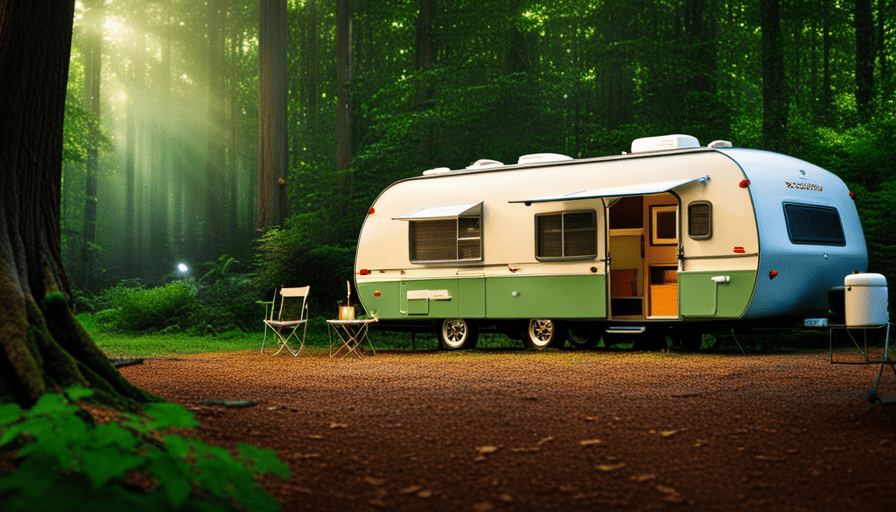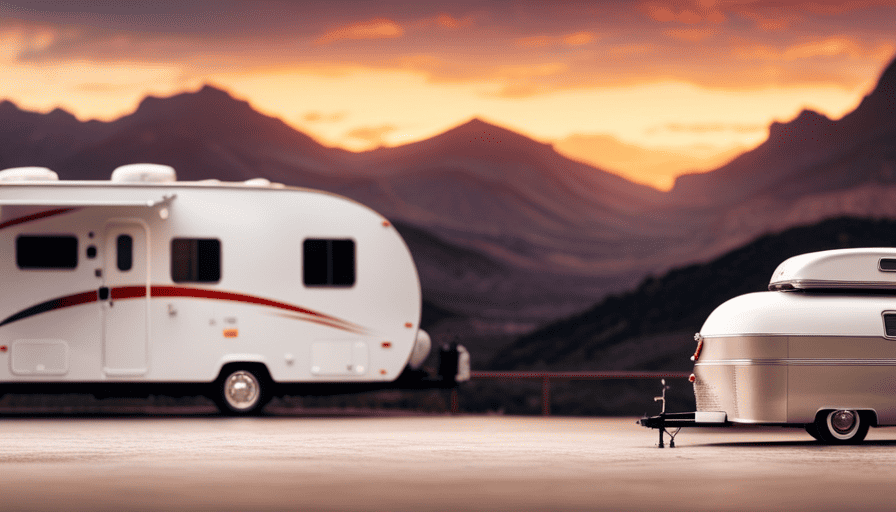Winter is the perfect time to cozy up in a camper for a relaxing getaway. However, having an unexpected visit from unwanted furry guests is the last thing you want during your winter escape.
Imagine waking up to the sound of tiny paws scurrying across the floor or finding chewed wires and shredded insulation. To prevent such unwanted encounters, it’s crucial to take proactive measures to keep mice out of your camper during winter.
In this article, I will guide you through a series of simple and effective steps to ensure your camper remains mouse-free throughout the season. From inspecting and sealing potential entry points to using natural deterrents and seeking professional assistance when needed, these methods will help keep your camper cozy and critter-free all winter long.
So let’s dive in and learn how to protect your camper from these uninvited guests.
Key Takeaways
- Inspect and seal potential entry points (pipes, vents, windows).
- Use rodent-proof insulation or suitable materials to seal openings.
- Properly store food in airtight containers and clean up spills immediately.
- Use natural deterrents such as peppermint oil-soaked cotton balls and ammonia mixed with water.
Inspect and Seal Potential Entry Points
Don’t let those pesky mice find their way into your cozy camper this winter – make sure to inspect and seal any potential entry points!
One of the first things you’ll want to do is check your camper thoroughly for any gaps or cracks where mice could squeeze through. Pay close attention to areas around pipes, vents, and windows. If you find any openings, be sure to seal them up using rodent-proof insulation or other suitable materials.
In addition to inspecting and sealing entry points, it’s also important to create a mouse-proof storage system inside your camper. Mice are attracted to food and they can easily chew through cardboard boxes or plastic bags. Instead, store your food in airtight containers made of metal or glass. This will help prevent mice from getting to your food and potentially causing damage.
Now that you’ve inspected and sealed any potential entry points and created a mouse-proof storage system, it’s time to move on to the next step. Use steel wool or mesh to block small openings such as gaps around pipes or holes in the walls. This will ensure that mice cannot squeeze through these areas and find their way into your camper.
By taking these steps to inspect, seal, and create a mouse-proof storage system, you can greatly reduce the chances of mice finding their way into your camper this winter.
Use Steel Wool or Mesh to Block Small Openings
Use steel wool or mesh to seal any small openings in your camper, preventing unwanted visitors from finding their way inside during the colder months. Steel wool is an excellent choice for blocking small openings because it’s durable and resistant to chewing. However, if you prefer alternatives to steel wool, there are other natural deterrents you can use. Copper mesh is a great option as it’s also chew-proof and can be easily molded to fit any opening.
Additionally, aluminum foil can be used to cover small gaps or cracks, acting as a temporary barrier. It’s important to remember that mice can squeeze through tiny openings, so even the smallest gaps should be sealed.
Once you have sealed the small openings, you can move on to the next step of preventing mice from entering your camper during winter – installing door sweeps and weather stripping. These additional measures will further enhance the protection of your camper against unwanted guests, ensuring a cozy and mouse-free environment.
Install Door Sweeps and Weather Stripping
To make your camper more cozy and prevent any unwelcome cold drafts, it’s time to get those door sweeps and weather stripping installed. These simple yet effective measures will help keep mice out and maintain a comfortable environment inside your camper during the winter months.
When it comes to door sweeps and weather stripping, there are various options available. You can choose from traditional materials like rubber or opt for alternative insulation options such as foam strips. Whichever material you choose, make sure it’s durable and able to withstand the elements.
To install door sweeps, start by measuring the width of your camper door and cutting the sweep to fit. Attach it to the bottom of the door using screws or adhesive.
Weather stripping should be applied to the gaps and cracks around windows, doors, and any other openings where mice could potentially enter. DIY methods for sealing these gaps and cracks include using caulking, expanding foam, or adhesive-backed strips.
By properly installing door sweeps and weather stripping, you’ll create a barrier that mice can’t easily penetrate. This will not only help keep the cold air out but also prevent mice from finding their way into your camper.
Now that your camper is properly sealed, let’s move on to the next step and discuss how to keep food and trash securely stored.
Keep Food and Trash Securely Stored
Make sure you store your food and trash securely in order to maintain a clean and pest-free environment inside your cozy camper during the chilly months. Here are some food storage methods and proper trash disposal techniques to help keep mice out of your camper:
-
Use airtight containers: Store all food items in tightly sealed containers to prevent mice from accessing them. This includes pantry staples, snacks, and pet food. Avoid leaving any food out in the open.
-
Clean up spills and crumbs immediately: Mice are attracted to food residue, so be diligent about wiping down surfaces and vacuuming up any crumbs or spills. This will help eliminate potential food sources for mice.
-
Dispose of trash properly: Make sure your camper has a secure trash can with a tight-fitting lid. Empty it regularly and seal the bags tightly before disposing of them in an outdoor trash bin. This will help prevent mice from being attracted to the smell of food in the trash.
-
Avoid leaving food scraps outside: If you’re camping in an area with wildlife, it’s important to properly dispose of food scraps. Use designated trash bins or composting facilities, and never leave food waste outside your camper.
By following these food storage and trash disposal methods, you can greatly reduce the risk of attracting mice into your camper. In the next section, we’ll explore natural deterrents such as peppermint oil or ammonia to further keep mice away.
Use Natural Deterrents such as Peppermint Oil or Ammonia
Enhance your cozy camper experience this winter by harnessing the power of natural deterrents like peppermint oil or ammonia to keep those unwanted visitors away. When it comes to alternative natural deterrents for mice in campers, both peppermint oil and ammonia have proven to be effective options.
Peppermint oil is a popular choice due to its strong scent, which mice find unpleasant. Simply soak cotton balls in peppermint oil and place them in areas where mice are likely to enter, such as near openings or in storage compartments. The strong aroma will deter mice from venturing into your camper, making it a safe and mouse-free environment.
Ammonia, on the other hand, works by creating a strong odor that mice find repulsive. To use ammonia as a deterrent, mix it with water in a spray bottle and apply it to areas where mice are known to frequent. This can include corners, under furniture, or near food storage areas. The scent of ammonia will discourage mice from entering your camper, ensuring a pest-free camping experience.
When it comes to comparing the effectiveness of peppermint oil versus ammonia, it ultimately depends on personal preference. Some campers find that peppermint oil is more effective, while others swear by ammonia. It may be worth trying both options to see which one works best for you.
In the next section, we’ll discuss how to set traps or baits in strategic locations to further prevent mice from entering your camper. By combining natural deterrents with these methods, you can effectively keep mice out and enjoy a worry-free camping experience.
Set Traps or Baits in Strategic Locations
By strategically placing traps or baits in key areas, you can further fortify your camper against unwelcome rodent visitors during the colder months. Here are some alternative trapping methods to consider:
-
Snap traps: These classic traps are effective in catching mice quickly and humanely. Place them along walls or in areas where you’ve noticed rodent activity.
-
Electronic traps: These devices deliver a quick electric shock to mice, ensuring a swift and humane kill. They can be set up in areas where mice are likely to travel, such as near food sources or along known pathways.
-
Live traps: If you prefer to catch and release mice, live traps are a great option. Set them up with bait inside, and once a mouse is caught, release it far away from your camper.
In addition to trapping, it’s important to take preventive measures for long-term rodent control. Seal any gaps or cracks in your camper to prevent mice from entering. Keep food stored in airtight containers and clean up any crumbs or spills promptly. Regularly inspect and clean your camper to remove potential nesting materials.
By keeping up with these preventive measures and using effective trapping methods, you can minimize the risk of mice infestation in your camper. Transitioning to the next section, it’s also important to regularly clean and declutter your camper to further discourage rodents from making it their home.
Clean and Declutter the Camper Regularly
Regularly cleaning and decluttering your camper can help to discourage rodents from making it their home during the winter months. Performing regular maintenance and organizing your camper can go a long way in preventing mice from finding a cozy spot.
Start by removing any unnecessary items or clutter that may provide hiding places for rodents. Keep your camper clean by sweeping the floors and wiping down surfaces regularly. Pay special attention to areas where food is stored or prepared, as crumbs or food residue can attract mice. Use a vacuum to clean upholstery and carpeted areas, as these can also harbor food particles that may entice rodents.
Additionally, make sure to seal any cracks or openings in your camper that could serve as entry points for mice. By following these organizing tips and maintaining a clean living space, you can create an environment that is less inviting to rodents. This will help to prevent infestations and keep mice out of your camper.
Removing any nesting materials or signs of infestation is the next crucial step in ensuring a mouse-free winter.
Remove any Nesting Materials or Signs of Infestation
Make sure you promptly remove any signs of nesting materials or infestation in order to create a safe and comfortable environment for you and your family. Preventive measures are key to keeping mice out of your camper during the winter months.
Begin by thoroughly inspecting your camper for any signs of mice, such as droppings, chewed wires, or shredded materials. If you find any evidence of mice, it’s important to take immediate action to eliminate the problem.
To prevent mice from nesting in your camper, remove any materials that could be used for nesting, such as cardboard boxes, paper, or fabric. Keep your camper clean and decluttered, as mice are attracted to food and cluttered areas. Seal any openings or cracks in your camper, as mice can easily squeeze through small spaces. Consider using mice-proofing techniques, such as steel wool or wire mesh, to seal off potential entry points.
By taking these preventive measures and removing any nesting materials or signs of infestation, you can greatly reduce the chances of mice making your camper their winter home.
Now, let’s discuss another effective method to keep mice out of your camper during winter – consider using ultrasonic repellents.
Consider Using Ultrasonic Repellents
One effective way to ward off unwanted furry guests during the colder months is to give ultrasonic repellents a whirl. Ultrasonic repellents are devices that emit high-frequency sound waves that are inaudible to humans but irritating to mice and other pests. These waves create a hostile environment for mice, deterring them from entering your camper.
But are ultrasonic repellents truly effective, or are they just a gimmick? The answer is that it depends. While some people swear by the effectiveness of ultrasonic repellents in keeping mice away, others claim that they had little to no effect. It is important to note that the effectiveness of these devices can vary depending on factors such as the size of your camper, the severity of the infestation, and the behavior of the mice in your area.
In addition to ultrasonic repellents, there are also natural deterrents that can be effective in repelling mice. These include peppermint oil, vinegar, and mothballs. However, it’s important to keep in mind that natural deterrents may not be as potent as ultrasonic repellents and may require more frequent application.
If you find that ultrasonic repellents or natural deterrents aren’t effective in keeping mice out of your camper, it may be time to seek professional pest control assistance. Pest control professionals have the knowledge and experience to effectively deal with mice infestations and can provide you with the best solution for your specific situation.
While ultrasonic repellents can be an effective way to deter mice from entering your camper, their effectiveness may vary. It’s also worth considering natural deterrents, but if these methods fail, seeking professional pest control assistance is the next step in ensuring a mouse-free camper.
Seek Professional Pest Control Assistance if Needed
If all else fails, it’s time to call in the experts for professional pest control assistance to ensure a cozy and mouse-free winter in your camper. While there are many DIY methods available to keep mice out of your camper, sometimes the problem persists despite your best efforts. In such cases, seeking professional pest control services is the most effective solution.
Here are three reasons why professional assistance may be necessary:
-
Expertise: Pest control professionals have the knowledge and experience to identify the root cause of your mouse infestation and implement the appropriate measures to eliminate it. They can conduct a thorough inspection of your camper, identify potential entry points, and recommend the best course of action.
-
Specialized Equipment: Pest control experts have access to specialized equipment and products that aren’t readily available to the general public. These tools enable them to effectively eliminate mice and prevent future infestations. They can also use safe and environmentally friendly methods to ensure the well-being of you and your camper.
-
Time and Effort: Dealing with a mouse infestation can be time-consuming and frustrating. By hiring professional pest control services, you can save yourself the hassle of trying multiple DIY methods that may not yield desired results. The experts will handle the problem efficiently, allowing you to enjoy a worry-free winter in your camper.
If your attempts at keeping mice out of your camper during winter have been unsuccessful, it’s advisable to seek professional pest control assistance. Their expertise, specialized equipment, and ability to save you time and effort make them the best choice for ensuring a mouse-free environment in your camper.
Frequently Asked Questions
Are there any specific types of steel wool or mesh that work best for blocking small openings in a camper?
When it comes to blocking small openings in a camper to keep mice out, there are several steel wool alternatives and DIY mouse-proofing techniques that can be effective.
One popular alternative to steel wool is copper mesh, which is more durable and resistant to corrosion.
Another option is stainless steel mesh, which is known for its strength and longevity.
These materials can be used to seal off any gaps or cracks where mice could enter your camper, ensuring a mouse-free environment.
How often should door sweeps and weather stripping be replaced in order to maintain their effectiveness?
Replacing door sweeps and weather stripping is essential for maintaining their effectiveness over time. Just like a well-oiled machine, these components require regular maintenance to ensure optimal performance.
Over time, door sweeps and weather stripping can become worn, torn, or lose their seal, allowing unwanted pests and drafts to enter. By replacing them periodically, you can prevent potential issues and keep your camper secure and insulated.
Remember, prevention is key when it comes to maintaining a pest-free and cozy camper.
Can I use other essential oils besides peppermint oil to deter mice from entering my camper?
Yes, there are alternative mouse deterrents besides peppermint oil that can be used to keep mice from entering your camper. However, it’s important to be aware of the potential hazards of using essential oils for pest control. Some essential oils can be toxic to pets or humans if ingested or used improperly. It’s always best to research the specific essential oil you plan to use and follow the recommended guidelines to ensure safety and effectiveness.
What are some common signs of a mouse infestation in a camper?
Common signs of a mouse infestation in a camper include droppings, gnawed wires or insulation, and a strong musty odor.
To prevent mice from entering a camper, it’s important to seal any gaps or openings, such as around pipes or vents. Keep food stored in airtight containers and clean up any crumbs or spills immediately.
Traps can be effective, but it’s crucial to regularly check and dispose of any caught mice.
Are there any natural ways to repel mice that are safe for pets and children?
Natural mouse repellents are an effective and safe way to keep unwanted pests away from your camper. DIY mouse prevention methods can involve using specific aromatic substances that mice dislike, such as peppermint oil or cloves. These natural repellents can be easily applied in areas where mice are likely to enter, deterring them from entering your camper. It’s important to ensure that the chosen repellents are safe for pets and children to avoid any harm or adverse reactions.
Are the same methods used to keep mice out of a camper during winter storage as in the winter?
When it comes to keeping mice out camper in winter storage, the same methods can generally be used as in the winter. This includes sealing any entry points, using deterrents like peppermint oil or mothballs, and keeping the interior clean and free of food crumbs.
Conclusion
So there you have it, folks! By following these simple steps, you can effectively keep mice out of your camper during the winter months.
Remember, mice can squeeze through tiny openings, so be thorough in inspecting and sealing potential entry points. Use steel wool or mesh to block any small openings, and install door sweeps and weather stripping to further deter them.
Keep your food and trash securely stored, and consider using natural deterrents like peppermint oil or ammonia.
Clean and declutter regularly, removing any nesting materials or signs of infestation. And if all else fails, don’t hesitate to seek professional pest control assistance.
Now, here’s an interesting statistic for you: Did you know that a mouse can fit through a hole the size of a dime? Just imagine how many of those little critters you could be keeping out of your camper with these prevention methods!
Stay mouse-free and enjoy your winter camping adventures.











